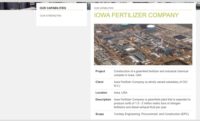Emcor Group lost $242 million in the second quarter of 2020, but not just because the specialty contracting giant was hit hard by the coronavirus pandemic and related economic trouble, which have cut into travel and energy use.
The Norwalk, Conn.-based public company (EME-NYSE) said it booked most of its loss based on the write-down of the value of its industrial-contracting assets. The contracting asset value took the hit because forecasts saw lower revenue and profits, and higher financing costs ahead.
And under generally accepted accounting principles, the non-cash “impairment” of assets must be recorded against operating income.
Across its various market-sector units, which include electrical and mechanical construction and facilities services, revenue fell off sharply in the second quarter compared to the year prior.
U.S. industrial services fell off the most, $83.3 million, to $212.2 million, or $28.2% from the same quarter in 2019, the company reported.
Emcor recorded the majority of its impairment to goodwill and other intangible and long-lived assets.
Despite operating income of $110 million on $2.01 billion in revenue for the second quarter, the asset-impairment charge pinned a $122.6-million operating income loss on the company in the second quarter.
In Q2 of 2019, Emcor had $120 million in operating income on $2.3 billion in revenue.
Excluding the hit from the asset impairment, the company remained solidly profitable. In the quarter, Emcor slashed costs via staff furloughs and layoffs, executive pay reductions, travel cuts and the now-needed implementation of workplace safety measures.
But the picture from the energy industry remains bad.
U.S. oil drilling dropped to 15-year low, according to Bloomberg, and the number of active oil rigs in the U.S. fell to 247, down from 687 at the same time last year, Baker Hughes reported Aug. 7.
Before the coronavirus pandemic hammered the fossil fuel industry, the Russia-Saudi price war had led to work stoppages, furloughs and spending cuts at energy companies, particularly oil and gas producers in the U.S. Marcellus and Permian shale areas.
That kind of trouble leads to longer completion times for downstream construction projects, said industry analysts in March.
Since then, the worldwide pandemic has dramatically worsened.
Exposure to Oil & Gas Industry
Emcor stock analysts had many questions at an Aug. 3 conference. As a company that is a collection of acquired specialty contractors and subcontractors, Emcor has grown organically but also with the steady purchase of much smaller companies.
Brent Thielman, an equity analyst at D.A. Davidson, said it appeared that Emcor’s electrical-contracting businesses were more affected by the general downturn than its mechanical businesses.
Four years ago, Emcor acquired Rabelais I&E Constructors, a Corpus Christi-based electrical and mechanical contractor, and Ardent Services, a Covington, La.-based company, which, among its services, offers specialty electrical and instrumentation services for the process industries.
Both companies had exposure to the oil and gas industry, said Tony Guzzi, Emcor CEO.
Noelle Dilts, a director of equity research at Stifel Financial Corp., asked Guzzi about the prices of future acquisitions in the current business climate.
Guzzi replied that Emcor would continue to weigh acquisitions carefully.
He said he didn’t want Emcor “to be known as the people that are out there looking for a bargain,” adding that “I think there will be opportunities, but EMCOR in general does not look for distressed assets.”




Post a comment to this article
Report Abusive Comment